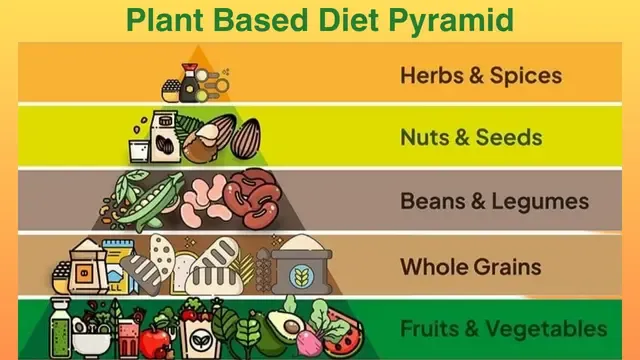Plant Based Diet Pyramid: A Journey to Wellness
Welcome to the power of the Plant-Based Diet Pyramid – the key to wellness. In a time where wellness is at the forefront, adopting a plant-based lifestyle is an important way to achieve peak health and balance.
This guide explains how to establish a strong health foundation using the strategic levels of the pyramid.
Are you ready to experience nutritious, plant-based foods that nourish your body, mind, and spirit?
Let's learn about a diet that promises to improve your life, foster sustainable habits, and deepen your connection with nature.
Join us in this exciting venture to unlock your health's full potential with the Plant-Based Diet Pyramid.
 |
| Plant Based Diet Pyramid |
🍲Table of Contents:
- Introduction
- Foundation of a Plant-Based Diet
- Building Blocks of a Plant-Based Diet
- Moderation and Variety in a Plant-Based Diet
- Supplementing a Plant-Based Diet
- Benefits of a Plant-Based Diet
- Challenges and Solutions for Adopting a Plant-Based Diet
- Conclusion
Foundation of a Plant-Based Diet
The foundation of a plant-based diet lies in consuming whole foods rich in a variety of nutrients. These foods provide essential vitamins, minerals, fiber and phytochemicals that are beneficial for maintaining optimal health. It is important to choose mostly unprocessed or minimally processed foods to maximize nutritional value.
Building Blocks of a Plant-Based Diet
The building blocks of a plant-based diet include fruits and vegetables, which should make up the majority of your daily meals. These provide essential nutrients, antioxidants and fiber.
Whole grains, such as brown rice, quinoa and oats, provide complex carbohydrates and fiber, while legumes, such as beans, lentils and chickpeas, provide plant-based protein, fiber and various micronutrients.
READ ALSO: How does a food pyramid help individuals eat a healthy diet?
Moderation and Variety in a Plant-Based Diet
While plant-based diets focus on plant-derived foods, it's also important to include small amounts of healthy fats and plant-based proteins, such as nuts, seeds and avocados. They provide important nutrients including omega-3 fatty acids and essential amino acids.
Supplementing a Plant-Based Diet
There are some nutrients that may be more challenging to obtain from a plant-based diet alone, such as vitamin B12, iron and omega-3 fatty acids. Supplements or fortified foods can help ensure adequate intake of these nutrients.
Benefits of a Plant-Based Diet
- Heart Health: A plant-based diet, low in saturated fats and rich in fiber, can significantly reduce cardiovascular disease risk.
- Weight Control: High in fiber and low in calories, plant-based foods such as fruits and vegetables aid in weight loss and maintenance.
- Chronic Disease Risk Reduction: Those on plant-based diets may experience a lower incidence of diabetes, cancer, and hypertension thanks to the high antioxidant levels in these foods.
- Nutrient-Rich: Plant foods provide a bounty of vitamins, minerals, and antioxidants, ensuring healthy levels of nutrients like vitamins C and E, and minerals like potassium and magnesium.
- Gut Health: The abundant fiber in plant-based foods supports a balanced gut microbiome, improves digestion and promotes beneficial bacteria.
- Anti-Inflammatory: Antioxidant-rich fruits, vegetables, nuts, and seeds help diminish chronic inflammation, aiding in the prevention and treatment of diseases like arthritis.
- Environmental Impact: It can lessen your carbon footprint and resource use, helping in the fight against climate change.
- Ethical Choices: Plant-based eating supports animal welfare by avoiding animal products and factory farming, leading to a more humane food industry.
- Digestive Benefits: The fiber in this diets eases digestion and mitigates issues like constipation, while also being easier on the stomach than meat and dairy.
- Sustained Energy: It offer complex carbs for a steady energy source, preventing the crash from processed foods and sugar.
Challenges and Solutions for Adopting a Plant-Based Diet
Although a plant-based diet offers many benefits, transitioning to this way of eating can present challenges. These may include difficulty finding plant-based options when dining out, social pressures, and concerns about meeting nutritional needs.
Solutions include meal planning, seeking support from like-minded individuals, and working with a registered dietitian or nutritionist.
Conclusion
Adopting a plant-based diet can be a transformational journey toward better health and well-being.
By focusing on a foundation of nutrient-rich whole foods, moderation and variety, and supplementing when needed, individuals can reap the many benefits of a plant-based lifestyle while addressing any challenges that may arise.
READ MORE:
⏩ Top 8 hangover myths debunked





